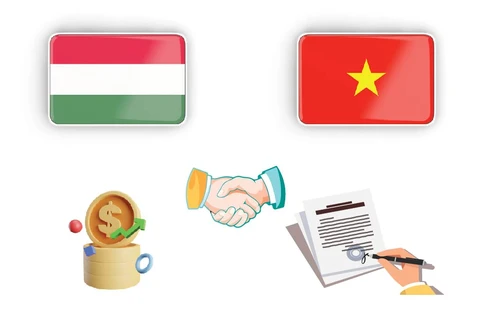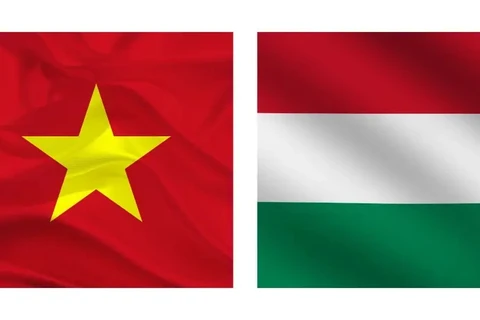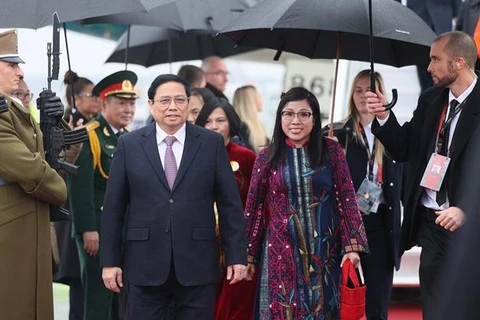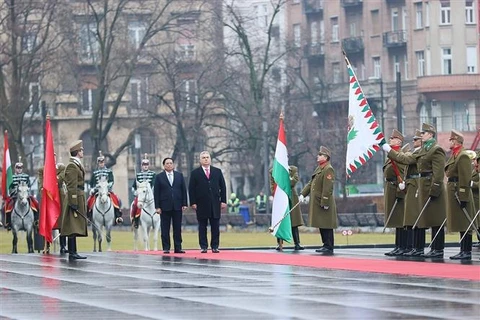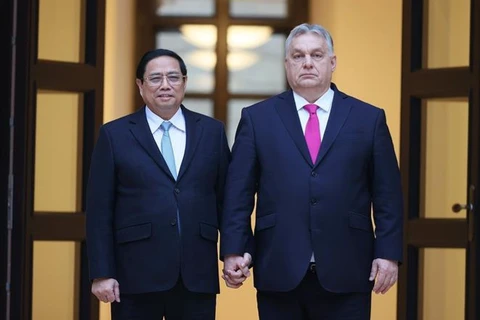 Prime Minister Pham Minh Chinh (L) and Hungarian President Katalin Novák at their meeting in Budapest on January 19 as part of the former's official visit to Hungary. (Photo: VNA)
Prime Minister Pham Minh Chinh (L) and Hungarian President Katalin Novák at their meeting in Budapest on January 19 as part of the former's official visit to Hungary. (Photo: VNA) Novák said she hopes Hungary-Vietnam cooperation will continue to develop across all sectors based on mutual respect, and become a model for East-West collaboration. She described PM Chinh’s visit as a significant milestone in the Hungary-Vietnam comprehensive partnership, and acknowledged Vietnam's role and position regionally and globally.
The president urged the two sides to closely coordinate to implement the agreements reached during the Vietnamese PM's visit to leverage the existing potential and promote cooperation in all fields, from politics, economy-trade-investment, to education-training, culture, and people-to-people exchange.
For his part, PM Chinh said in implementing an independent, self-reliant, diversified, and multilateral foreign policy, Vietnam always places importance on strengthening relations with traditional friends, including Hungary – a priority partner in Central Eastern Europe.
For his part, PM Chinh said in implementing an independent, self-reliant, diversified, and multilateral foreign policy, Vietnam always places importance on strengthening relations with traditional friends, including Hungary – a priority partner in Central Eastern Europe.
Chinh called for increased contact and exchanges at all levels and between their ministries, sectors, and localities to enhance political trust and mutual understanding, which he said is the foundation for promoting and expanding bilateral cooperation across all aspects.
Both leaders agreed on the importance of economy-trade-investment collaboration, considering it a driving force for bilateral relations in the years to come. In this spirit, PM Chinh proposed that President Novák encourage Hungarian companies to boost business partnerships with their Vietnamese peers, particularly in areas where Hungary excels such as pharmaceuticals, animal husbandry, food processing, renewable energy, and water management.
Disclosing her intention to visit Vietnam this year, the Hungarian President suggested that the two sides coordinate to organise the 10th Meeting of the Vietnam-Hungary Joint Committee on Economic Cooperation during her visit.
Regarding education and training, both sides were pleased with positive results obtained in this traditional cooperation area, highlighting the effectiveness of direct collaboration between the nations’ universities and training institutions. Currently, nearly 1,000 Vietnamese students are studying at Hungarian universities through scholarships granted by the Hungarian government.
The leaders agreed to continue maintaining sideline contacts at multilateral forums and closely coordinating and supporting each other within international organisations, especially the UN, Asia-Europe Meeting (ASEM), and ASEAN-EU mechanism, contributing to peace, stability, cooperation, and development in the region and the world.
They also concur to join hands in addressing new global challenges such as climate change, food security, and aging population.
On the occasion, PM Chinh thanked the Hungarian government for its support for the Vietnamese expatriate community. He said he hopes that the group will continue to be provided with favourable conditions to stabilise their lives, integrate more deeply into Hungary’s society, and make positive contributions to the host country’s socio-economic development and to the two nations’ traditional friendship./.
Both leaders agreed on the importance of economy-trade-investment collaboration, considering it a driving force for bilateral relations in the years to come. In this spirit, PM Chinh proposed that President Novák encourage Hungarian companies to boost business partnerships with their Vietnamese peers, particularly in areas where Hungary excels such as pharmaceuticals, animal husbandry, food processing, renewable energy, and water management.
Disclosing her intention to visit Vietnam this year, the Hungarian President suggested that the two sides coordinate to organise the 10th Meeting of the Vietnam-Hungary Joint Committee on Economic Cooperation during her visit.
Regarding education and training, both sides were pleased with positive results obtained in this traditional cooperation area, highlighting the effectiveness of direct collaboration between the nations’ universities and training institutions. Currently, nearly 1,000 Vietnamese students are studying at Hungarian universities through scholarships granted by the Hungarian government.
The leaders agreed to continue maintaining sideline contacts at multilateral forums and closely coordinating and supporting each other within international organisations, especially the UN, Asia-Europe Meeting (ASEM), and ASEAN-EU mechanism, contributing to peace, stability, cooperation, and development in the region and the world.
They also concur to join hands in addressing new global challenges such as climate change, food security, and aging population.
On the occasion, PM Chinh thanked the Hungarian government for its support for the Vietnamese expatriate community. He said he hopes that the group will continue to be provided with favourable conditions to stabilise their lives, integrate more deeply into Hungary’s society, and make positive contributions to the host country’s socio-economic development and to the two nations’ traditional friendship./.
VNA
